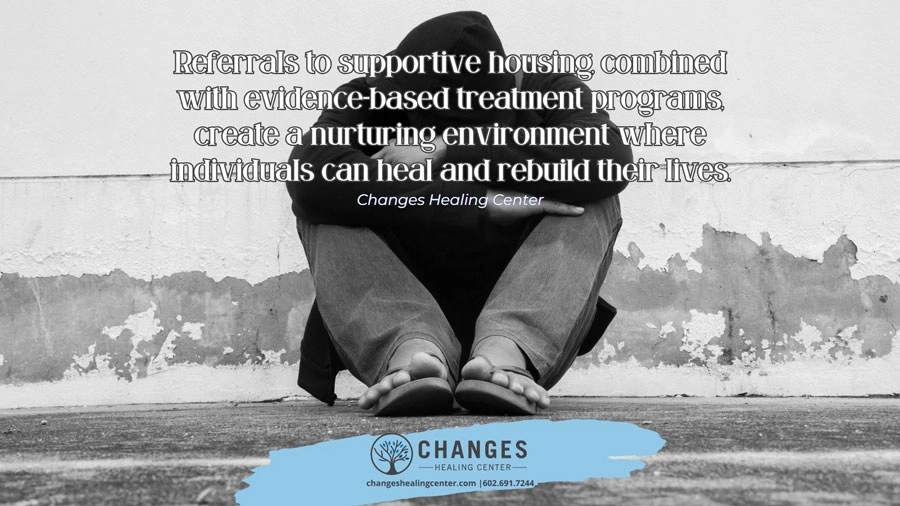Attending an IOP with Housing in Arizona
Table of Contents
If you have substance use disorders or other mental health struggles but need to balance daily responsibilities, an intensive outpatient program could be an excellent fit. However, others may find they need supportive housing, especially if their insurance will only approve intensive outpatient treatment instead of residential care. That leaves some to ask: Can you go to an IOP with housing in Arizona?
Our team says yes. Changes Healing Center offers clients accredited IOP with housing through licensed facilities in the greater Phoenix area and across Maricopa County. We understand that access to addiction treatment programs depends on finding the right balance of support. Unfortunately, that’s often determined by the insurance company covering the costs.
We invite you to continue reading to learn how to combine outpatient services, such as partial hospitalization programs (PHP) or intensive outpatient programs (IOP), with supportive housing.
Why Clients Request Supportive Housing Options
Clients requesting a referral to a sober living facility usually do so for three reasons:
A Chaotic or Stressful Home Life
They work a stressful job or other daily responsibilities and return home to a triggering, unsupportive environment. A sober living home gives them a calm, predictable sense of structure needed during recovery.
Example: ‘Trina’ was a young adult who worked hard as a data entry specialist and loved her job. The problem with her sobriety came from living with her parents and siblings due to some financial constraints. She had a large, loud family, who triggered her trauma and alcohol addiction. She had tried attending treatment, but struggled to stay in recovery because of the chaos.
The admissions coordinator at Changes Healing Center found a solution. Trina could work, go to rehab in the evenings, and stay at a sober living home while she worked on her coping skills. The admissions coordinator promised her that family therapy would most definitely be part of her intensive outpatient program, ensuring family harmony after rehab.
They Live Far from a Quality Treatment Center
The person’s insurance coverage for rehab has only approved them for an intensive outpatient program or a partial hospitalization program. Changes, their preferred recovery center, is a bit of a far commute. A sober living facility makes this option possible.
Example: ‘Trace’ was a remote worker living in a rural Arizona county. He knew he needed to confront his drinking problem, but his rural community only had one intensive outpatient program provider, which didn’t accept his company’s insurance plan. Changes accepted his coverage, but it was a 90-minute drive away in Phoenix. Trace decided to take a spot in a supportive living home near the rehab center for the duration of his outpatient rehab program. He continued his remote job, with none of his co-workers aware of his location change.
They Lack Both Family Support and Housing
The individual lacks shelter altogether. We sometimes see this with struggling young adults who couch surf or live in a car. Their addiction treatment programs require stable housing, and a sober living home is an affordable option.
Example: ‘Josh’ attended a local trade school on a scholarship, but his lack of housing had interfered with his life quality. Josh’s parents would allow him to live there, but he didn’t like all their rules and had left without think things through. He had been using drugs to dull the pain of living in his truck, and the problem had recently started interfering with school. Josh knew he needed recovery and learned that Changes accepted his Arizona Medicaid plan.
He found a very affordable sober living home and a part-time job to cover the living costs. With supportive housing, Josh was able to use his summer break at an intensive outpatient program and continued living in the sober facility. With recovery as his top priority, he made amends with his parents, who fully support his effort and have welcomed him back to family life.
Insurers Are Likelier to Approve an Intensive Outpatient Program

In our experience, some insurance programs and plans are more likely to approve an Arizona intensive outpatient program than inpatient treatment or a partial hospitalization program.
Because insurance companies use confusing language, we urge you to call our insurance team for guidance on getting your outpatient treatment and other recovery services approved. We’ll even call them for you and explain your need for an intensive outpatient treatment, partial hospitalization program (PHP), or residential treatment, based on our assessment of your needs.
We know the ins and outs of the industry and have the specific communication skills that will convince them to allow maximum benefits for your rehab and recovery. We’ll help you get the most treatment with little or zero costs out of your own wallet.
Various outpatient treatment programs are the preferred rehab option of insurers for many reasons:
IOP Provides Comprehensive Treatment for Lower Costs
Because IOP treatment requires fewer treatment hours, it’s less costly to insurers than partial hospitalization programs and residential treatment. The lower level of care gives plan members access to evidence-based therapies in a more flexible setting. Insurers see IOP programs as the most efficient programs for most patients to overcome their challenges with drug and alcohol abuse. Staying at a sober living home can offer ongoing support in the evenings after leaving the substance abuse treatment center.
Continued Benefits Mean Maintaining Employment
People with successful professional lives depend on their group health benefits to cover the cost of recovery programs. If they leave a job to get the extra support they need, they could lose both their coverage and access to alcohol and drug recovery programs. An Arizona IOP with supportive housing is a good solution for those who must maintain their job but must be away from the triggers of home during recovery.
Policy Limitations Under Some Insurance Programs
Many policies include specific language expressing limitations on access to various levels of care, especially PHP and inpatient treatment programs. These limits make intensive outpatient treatment more accessible to many plan members. If you need IOP treatment but don’t have a stable home life, sober living support can complement your daytime addiction treatment.
Mental Health Concerns Addressed in Intensive Outpatient Treatment

Outpatient treatment programs can offer numerous comprehensive treatment services. In outpatient therapy, clients receive individual therapy, group therapy sessions, and family counseling – each beneficial for managing their mental health concerns.
In addition to providing treatment for PTSD and trauma disorders that often accompany addiction, some of the other forms of mental health disorders that may benefit from an intensive outpatient rehab are the following:
- Depression
- Anxiety disorders (including panic attacks)
- Bipolar disorder
- Obsessive-compulsive disorder
- Substance use disorders (drug or alcohol addiction)
- Personality disorder
Most IOPs take a comprehensive approach to outpatient treatment programs, offering a balance of structured support during programs and flexibility to attend daily life, whether that’s school or a job.
Addiction Treatment and Therapies at Changes Healing Center
The qualified professionals at Change believe in taking a holistic approach that considers the individual well-being of every client. Those in our intensive outpatient treatment programs receive highly effective compassionate care that will lead them to long-term recovery.
But that doesn’t mean our treatment programs are cut from a single cookie cutter. All clients have unique challenges, so we address each person individually. As we share the key components of our outpatient addiction treatment programs, keep in mind that your therapy may look a little different. Why? Because we will custom-craft the best intensive outpatient program for you.
A Structured Setting for Your Recovery Journey
Providing structure helps people in recovery understand what to expect and when to expect it. Those seeking IOP treatment with supplemental sober living often share stories of home lives filled with chaos and trauma that contribute to their depression, anxiety, or drug addiction.
Attending therapy becomes a routine part of daily life, giving clients a sense of calm and reassurance.
Medical Detox to Reduce the Discomfort of Withdrawal

Breaking free of an addiction to drugs or alcohol often starts with detoxing, the process in which the body metabolizes and releases the remnants of substance use. Some withdrawal symptoms, such as seizures or thoughts of self-harm, can become medical emergencies.
Having professional monitoring of your withdrawal symptoms by a medical team gives you access to FDA-approved therapies to ensure your comfort and well-being.
After leaving a detox setting, patients typically move to residential treatment, an intensive outpatient program (IOP), or a partial hospitalization program (PHP), depending on their recovery needs.
Dual Diagnosis Treatment Programs
Some clients have a substance use disorder alongside an additional mental health concern or dual diagnosis. We follow the latest research and evidence-based practices, which suggest that it’s essential to provide therapy for the substance use disorder and the additional diagnosis simultaneously.
Individual Counseling and Therapy Sessions
Our clients receive individual therapy from some of Arizona’s top professionals. They can provide various individual therapies according to client needs:
- Dialectical behavior therapy
- Cognitive behavioral therapy
- Motivational interviewing
- Eye Movement Desensitization and Reprocessing
The goal of each drug and alcohol addiction program is to help clients overcome substance use and gain the tools to stay sober.
Working with Peer Groups
Work done in group therapy greatly benefits those in treatment, encouraging them to work with their peers. Together, program participants learn new coping skills, sharpen their communication, explore common triggers, and solve problems. The collective nature of this therapy helps clients learn firsthand how to build a supportive network of friends and family after they graduate from their treatment program.
Medication Management
Our clinician provides medication management to ensure any prescription drugs that help reduce substance abuse or other mental or physical health concerns are effective and given at the correct times. It helps prevent inaccurate or ineffective dosing and drug interactions that could pose a danger.
Aftercare Program Planning

An aftercare program, also called relapse prevention planning, helps each individual consider how they’ll stay sober after they leave the safety net of the recovery and treatment center. Many work on this in individual therapy but may also brainstorm during group therapy sessions.
The components of an aftercare plan are individualized to address specific needs but could include:
- Listing places to avoid that could trigger substance abuse
- Determining which people are safe and clean – they plan to call them for support when cravings arise
- Considering which people are not safe or clean…and planning how to avoid them
- Researching sober activities that support good mental health
- Finding community recovery and local support programs (Alcoholics Anonymous, Narcotics Anonymous, SMART Recovery
Relapse prevention planning is a highly personal process, with each person addressing their own anticipated recovery and support needs.
Start an Effective Intensive Outpatient Program at Changes
It’s time to get help if addiction has disrupted your school or work life. If inpatient seems like too restrictive an environment and your needs are not overly complex, an intensive outpatient treatment at Changes might offer you the best support to help you turn your life around.
You’ll receive healing care for all aspects of your addiction, including making strides toward improving your physical and mental health. Our admissions team wants to hear from you if you are ready for your recovery journey. We’ll take the time to learn about your recovery needs and how we can best support you. Reach out and contact us today.
